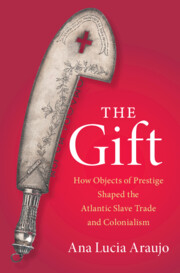Book contents
- The Gift
- Cambridge Studies on the African Diaspora
- The Gift
- Copyright page
- Contents
- Maps and Figures
- Maps
- Acknowledgments
- Introduction
- 1 The Loango Coast and the Rise of the Atlantic Slave Trade
- 2 La Rochelle and Atlantic Africa
- 3 Slave Traders Turned Pirates
- 4 Deciphering the Gift
- 5 A Displaced Gift
- 6 Ngoyo Meets Dahomey
- Conclusion
- Notes
- Bibliography
- Index
4 - Deciphering the Gift
Published online by Cambridge University Press: 26 October 2023
- The Gift
- Cambridge Studies on the African Diaspora
- The Gift
- Copyright page
- Contents
- Maps and Figures
- Maps
- Acknowledgments
- Introduction
- 1 The Loango Coast and the Rise of the Atlantic Slave Trade
- 2 La Rochelle and Atlantic Africa
- 3 Slave Traders Turned Pirates
- 4 Deciphering the Gift
- 5 A Displaced Gift
- 6 Ngoyo Meets Dahomey
- Conclusion
- Notes
- Bibliography
- Index
Summary
This chapter examines the eighteenth-century silver ceremonial sword fabricated in La Rochelle and given as a gift to Cabindas Mfuka Andris Pukuta following the conflict of 1775. The chapter argues that the object stands for a rich example of the complex interactions between French trades and Cabinda’s local authorities. The chapter explores the work and trajectory of the silversmith, who likely created the sword, and its connections to the shipowner Daniel Garesché and ship captain Jean Amable Lessenne. Like a large cutlass, the sword follows the format of a kimpaba, a Woyo insignia. The chapter explores the uses and meanings of this kimpaba, and its connections to other existing similar West Central African swords. The chapter argues that the sword symbolizes the increasing power acquired by coastal Woyo agents in detriment of the Ngoyo’s ruler whose powers were decreasing with the intensification of the slave trade.
Information
- Type
- Chapter
- Information
- The GiftHow Objects of Prestige Shaped the Atlantic Slave Trade and Colonialism, pp. 75 - 102Publisher: Cambridge University PressPrint publication year: 2023
